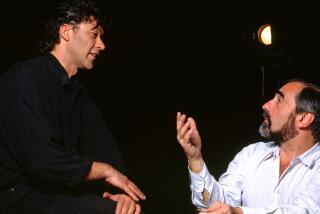JAZZ SPOTLIGHT : Morrison Takes Familiar Path, but It’s Not Jazz
- Share via
VAN MORRISON WITH GEORGIE FAME & FRIENDS
“How Long Has This Been Going On”
Verve
*
“Van Morrison’s first jazz recording,” trumpets the publicity for this new release by the veteran Irish singer-songwriter. And it’s probably a pretty good marketing ploy these days when the music’s return to prominence makes a connection with jazz considerably more politically correct for a pop artist than it was a decade ago.
But “Van Morrison’s first jazz recording?” Not this time. Morrison sings his relatively brief solo passages with familiar blues inflections. The jazz that takes place is provided by the underrated singer-organist Georgie Fame and a stellar backup band.
The tendency to associate Morrison with jazz is nothing new, of course, and, in the case of his early album, “Astral Weeks,” had a certain validity (largely due to the presence of bassist Richard Davis and drummer Connie Kay). But over the years since he arrived on the scene in the late ‘60s, the association for the most part has been misleading and inaccurate. More precisely, Morrison’s work--notably so in classics such as “Brown Eyed Girl” and “Moondance”--has simply been founded upon his own affectionate renderings of urban rhythm & blues and jump band styles from the ‘40s and ‘50s.
Despite its promotional spin, “How Long Has This Been Going On” takes a similar path. A 14-song program includes the predictable (“Blues in the Night,” “Moondance,” Mose Allison’s “Your Mind Is on Vacation”) and the unexpected (“Who Can I Turn To,” “That’s Life” and the title track). Within the narrow framework of his style, which relies heavily upon blues-based phrasing and a willingness to let his rhythm section move things along, Morrison isn’t a bad singer. And, since his intensity level is so vital to his music, his Saturday night barroom baritone is especially effective in performances such as this one, which was recorded live over a five-hour period at Ronnie Scott’s London jazz club.
But what’s distressing about the album is that it serves as a constant reminder of how many superior singers there are--Allison, Jon Hendricks, Bill Henderson and Joe Williams come immediately to mind--who can execute their own variations on R&B; and jump band styles with an authenticity and a musical depth well beyond Morrison’s reach. Yet, even given their relative prominence, none will experience, in their next recordings, the kind of notice he will receive for this outing.
Morrison deserves credit, nonetheless, for directing attention to one of the most appealing, too often overlooked eras in African American pop music. For a better hearing of the real stuff, listeners should check out reissue packages from Louis Jordan, Slim Gaillard, Amos Milburn, Percy Mayfield, Eddie “Cleanhead” Vinson, Johnny Otis and Big Joe Turner, to name only a few.
The rating, then, breaks out as follows: one star for Morrison’s earnestness as well as his choice of a style upon which to model his music; and one star for the workmanlike solos and accompaniment by saxophonist Pee Wee Ellis, trumpeter Guy Barker, pianist Robin Aspland, bassist Alec Dankworth and drummer Ralph Salmins. But if jazz singing is what you’re looking for, forget about Morrison and check out almost anything by Joe Williams or Shirley Horn.
More to Read
The biggest entertainment stories
Get our big stories about Hollywood, film, television, music, arts, culture and more right in your inbox as soon as they publish.
You may occasionally receive promotional content from the Los Angeles Times.










